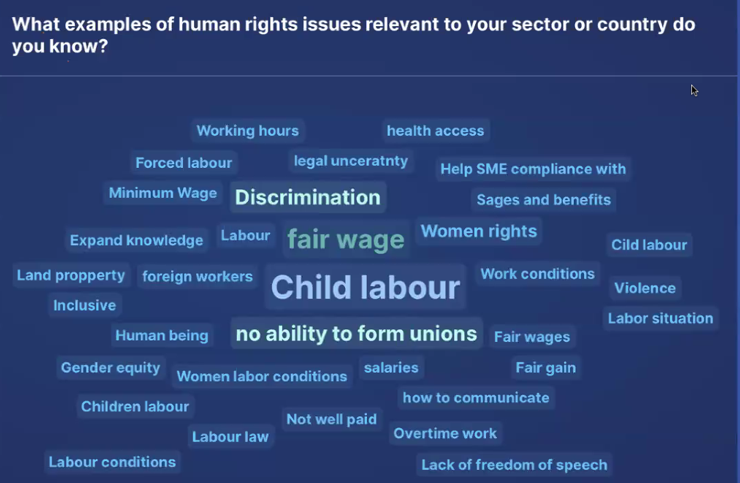It gets urgent: How can exporters fulfil their enhanced corporate human rights due diligence duties?
Companies that want to export to Switzerland and the EU will in future have to make great efforts to fulfill a more stringent corporate human rights due diligence duty for their own operations and for their entire supply chain. This due diligence is required by the EU's new Corporate Sustainability Due Diligence Directive or the German Supply Chain Due Diligence Act and new regulations in Switzerland. In the last four weeks SIPPO has therefore offered three webinars on the topic of ‘Human Rights Due Diligence’ (HRDD).

Between 80 and 90 participants from SIPPO’s partner BSOs, SIPPO staff and affiliated representatives from the TRIC network worldwide followed the training. The topics were excellently conveyed by the consulting company ‘focusright’, and the response from the participants was enthusiastic.
Promotion of sustainable and responsible corporate behaviour
Future Business Success of exporters into the Swiss and European markets is strongly influenced by growing demands on talent attraction, increased transparency of supply chains and digitalization und changing consumer and investor expectations. The EU's Corporate Sustainability Due Diligence Directive, which came into force in July 2024, aims to promote sustainable and responsible corporate behaviour and to integrate human rights and environmental considerations into companies' operations and corporate governance.
Webinar provided immediately implementable, practice-oriented knowledge
SIPPO played a pioneering role two years ago with the publication of the SIPPO Guiding Principles for Sustainable Trade (see https://www.sippo.ch/sustainability). SIPPO is now making a concrete contribution to the implementation of Principle 4, the promotion of responsible supply chain management, by supporting its member BSOs in enabling their members to apply the principles of transparency and due diligence. The three-part webinar was an excellent way of strengthening the capacity of BOS staff
- in supporting their member companies in proactively managing risks and opportunities stemming from their business operations
- in complying with increased legal requirements on Human Rights Due Diligence on EU and Swiss level
Comprehensive modules covering all facets of HRDD
Module 1 explained, why HRDD is relevant for BSOs and their members in the context of export promotion. One major conclusion: Companies must report transparently on their approach to HRDD and about their most salient human rights risks, by executing an honest assessment of all current and potential human rights impacts along the value chain.
It has been a very nutritious exercise, both theoretically and practically, which has allowed me to understand the corporate obligations to mitigate the impact on Human Rights generated in the supply chain. Training is a key guide for institutions and the responsibility with our exporters to advance responsible processes, understanding the lessons of real cases. Thank you for the interactive tool shared through QR code, it has been very interesting.
Ana María Castro Valderrama – Trade Advisor for Central and Eastern Europe at ProColombia
Participants of this first session expected practical examples – and they got many of them. They also listed a great number of Human Rights Issues they face, like child labour, discrimination, fair wages, which were dealt with in the presentation. Asked how BSOs can support their member organisations in meeting the increasing requirements regarding responsible business conduct, the participants favoured trainings, partly with experts, concrete capacity development activities and consequent awareness raising by disseminating information.
Module 2 described in detail how BSOs and exporters can assess their human rights risks, and Module 3 stepped down to demonstrate what kind of measures exporters can take to mitigate risks.
Open Social Space
The three online trainings were accompanied by a virtual social space that provides a platform for participants to engage in continued discussion, networking and knowledge sharing.



 Colombia
Colombia











